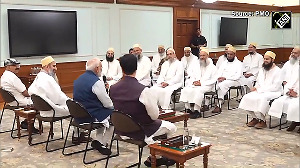The joint press statement recently issued to that effect on behalf of two senior BJP leaders, Yashwant Sinha and Arun Shourie, confirms one long-held suspicion of this analyst and simultaneously demolishes a belief that had become almost sacrosanct in our national life.
The suspicion has been that either the BJP's media cell doesn't read the commentaries posted on an important news portal like rediff.com or doesn't have a mechanism to apprise its top leaders of what it reads or its legal eagles are dormant or, lastly, the BJP just doesn't have a legal cell.
That must explain why BJP's cry for Parliament's approval to the 123 Agreement has come now and not almost two years ago when a whole article on these pages dealt precisely with that issue soon after our prime minister -- always hailed as a man of honesty and integrity -- told US President George W Bush that the nuclear deal had the Indian Parliament's 'support'.
That must also be why the BJP has kept mum whenever pro-United Progressive Alliance columnists have lashed out at the party for being hypocritical in criticising the nuclear energy deal considering that Atal Bihari Vajpayee's National Democratic Alliance government had itself wanted it when in power.
The BJP kept silent clearly because the party top brass had not read the US strategist Ashley Tellis's interview on rediff.com wherein, when asked why no deal was struck with the Vajpayee government, he replied: 'The deal could not be reached because the Vajpayee government did not offer much to the US in exchange for the agreement. We got more from the government of Dr Manmohan Singh.'
When asked further as to what it was that the US wanted from the Vajpayee government but could not get, he replied 'I am afraid I cannot answer this question.'
The BJP's response to the charge of hypocrisy lay right there, as simple as two plus two, but its leaders just didn't know the sum.
As an aside, the BJP's innocence about the legal area goes back to 1993 when P V Narasimha Rao's Congress-led government passed the Acquisition of Land at Ayodhya Act with the stated objective of acquiring all disputed and undisputed land in Ayodhya for building a multi-religious, socio-cultural centre there. The Statute thus killed the very raison d'etre of the BJP -- the Ram Mandir -- and yet the law was challenged in the Supreme Court not by the BJP but by the Ramjanmabhumi Trust and an individual Muslim among others.
The BJP's legal eagles, if any, were sleeping.
Now, with former prime minister V P Singh echoing the BJP's demand that the 123 Agreement should be subjected to a parliamentary resolution before any definitive action is taken on it, a belief that has been long-held by our politicians and intellectuals of various hues lies demolished. This is the belief that the Constitution of India as worked out by hard labour of three years was a unique, landmark document reflecting its creators' vast experience, erudition and vision as chiselled by Dr Babasaheb Ambedkar's Drafting Committee.
The fact that over 100 Constitutional Amendment Bills have been introduced till now and that the 94th Amendment Act came into effect from June last year prove that our founding fathers just didn't have a clue about the future.
They created what is probably the world's longest Constitution but laid down privileges for the 'minorities' without defining the word 'minorities'.
They created a Republic out of a nation partitioned on the basis of religion without insisting on a common civil law.
They created 'Equality before law' under Article 14 but scattered reservations and discriminations all over the place.
One Article here is 'notwithstanding' another Article elsewhere. Freedom of speech is subjected to conditions, with even Parliament being denied discussion of the conduct of a high court or Supreme Court judge excepting during a motion of his impeachment.
They failed to see the need for a federal police.
And, without any discussion, they threw out a freedom fighter's song to let one man decide on the national anthem.
With regard to international agreements, Article 253 empowers Parliament to make any law for implementing any treaty, agreement or covenant, but there is no provision anywhere in our long-winded Constitution that compels the central executive to make such a law.
Such then, readers, was the kind of foresight and wisdom of our founding fathers who fashioned our 'unique, landmark' Constitution! That despite their phenomenal advantage of having, before them, the constitutional practices which were operating in different parts of the world and which covered a rich fund of human experience in the area of governmental process.
Contrast the foresight of our Constituent Assembly members with those Americans who formulated the US Constitution. When it was written in 1787, there were only 13 states in the US. Over the last 220 years, that brief and compact instrument of just 4,543 words has been amended only 27 times. The pattern of government planned so long ago in less than a hundred working days for 13 states today meets the needs of a vast country of 50 states, one federal district and 14 territories.
Most importantly for this commentary, one part of Section 2 of Article II of the US Constitution says: 'He (the President) shall have Power, by and with the Advice and Consent of the Senate, to make Treaties, provided two thirds of the Senators present concur.'
That was written in 1787; that was why 212 years later the United Nations' Comprehensive Test Ban Treaty fell in the US although President Bill Clinton was among the first to sign it; that was foresight in play. QED.
Yes, the Indian Constitution needs one more amendment to overcome the perils of anything like the latest 123 Agreement. But a repair job will not do; what is wanted is a total overhaul to overcome contradictions and complications.
The BJP-led NDA did attempt to do something like that but failed; it failed because it employed the wrong people to steer the good intention. It engaged too many legal eagles for the purpose and superimposed on them an already overworked and retired judge.







 © 2025
© 2025